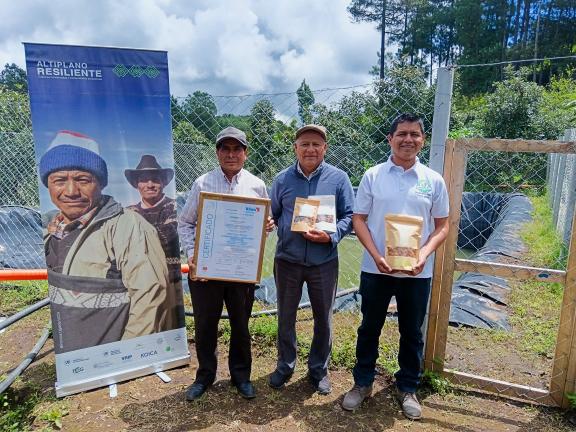Tomás Cuterez Lares grew up in the highlands of Guatemala, where he lives with his extended family. At eleven years old, Cuterez Lares lost his father, an apple grower, to the armed conflict in the 1980s. As the eldest brother, this tragedy forced him to drop out of school and dedicate himself to farming.
He began his community leadership journey at 16, which led him to co-found Cooperativa Integral Agrícola Unión Chipaquense (COINACHI). Passionate about the organisation's mission, he donated his own land for the organisation's operations.
COINACHI is dedicated to managing crops and water scarcity within the Chipacá micro watershed in the Guatemalan highlands. The Indigenous Mayan-K'iche populates this region and is highly vulnerable to climate change.

The upper part of the Motagua River watershed is 2,160 meters above sea level, where forested regions coexist with fruit crops. Photo: Evelyn Vargas/IUCN.
Growing more, naturally: harnessing nature-based solutions
The Resilient Highlands Project, financed by the Green Climate Fund (GCF) and implemented by the International Union for Conservation of Nature (IUCN), supports COINACHI to apply sustainable agricultural practices to maintain crops in this unique and fertile land.
The project has turned to nature-based conservation methods to build the resilience of local ecosystems and communities. Initiatives such as water harvesting, irrigation ditches, and agroforestry capture moisture in dry seasons. Soil management techniques like terraces, contour furrows, and adding organic matter enhance infiltration and prevent erosion during periods of heavy rain. Combined with crop diversification, these techniques boost soil fertility, resilience, carbon storage, and agricultural yields.

From left to right: Tomás Cuterez Lares, a 55-year-old founding member of COINACHI and producer of peaches, apples, and avocados; Miguel Morales Tecún, 63, the Commercial Development Manager of the cooperative, and Juan Morales Mateo, 39, COINACHI General Manager. They consider themselves part of the next generation in this initiative. Photo: Evelyn Vargas/IUCN.

The high fruit yield and quality of the Hass avocado result from implementing Ecosystem-based Adaptation (EbA) measures from the Resilient Highlands project. Photo: Evelyn Vargas/IUCN.
“We are already seeing the benefits of water harvesting on our crops. First, the ripening time is shortened; second, the size of the fruit can be controlled; and third, the production time is reduced so the product reaches the market before the majority. This means we have a competitive price for the producer achieving the profits we aim for.”

Tomás Cuterez Lares with his wife, Ana Tecún Mateo (left), his mother, Josefa Larios Mateo (right) and his son-in-law, Diego Coj Mateo. Photo: Evelyn Vargas/IUCN.

Tomás Cuterez Lares’ home in the Guatemalan highlands. Photo: Evelyn Vargas/IUCN.
Since its conception, COINACHI has grown in membership by 32.5 per cent. Members of the cooperative, along with their families, including the Cuterez Lares family, are among the 132,000 beneficiaries of the Resilient Highlands project.
Since 2020, this initiative has aimed to mitigate the impact of climate change on the hydrological cycle of the watersheds in the Guatemalan highlands and increase the resilience of ecosystems and local communities.
Miguel Morales Tecún, COINACHI's Commercial Development Manager, notes that locals have experienced the benefits of having a rainwater reservoir. Previously, during the dry season, local communities had to travel to rivers to collect water for their crops. Now, with the reservoir in place, water is stored in the reservoir and is available for up to four months, enough to cover the entire dry season.

Incorporating the keyline system has allowed the Cuterez Lares family to improve water management in their plot, achieving a high fruit load of excellent-quality Hass avocados. @Evelyn Vargas/IUCN.
“The avocado helped me get back on my feet and provide an education for my children. Many people have learned from my experience.”
The early harvest and high-quality fruit have enabled local communities to access national markets directly, placing their production in the most recognised supermarkets in Guatemala, avoiding price speculation, and eliminating the need for intermediaries.
Identifying a market that requires fruit of specific sizes enables better management of weight ranges, leading to a competitive price of about 50 per cent higher than average. Therefore, their product is weighed, classified, and packed to ensure freshness and a longer shelf-life.
With this shift towards sustainable agricultural practices, COINACHI has achieved a 75 per cent profit increase.
“We are getting this through the Resilient Highlands Project because [we receive] a bulletin that is shared in advance. For example, I have already received the latest bulletin, which alerts us about the El Niño phenomenon.”

COINACHI utilises Agroforestry Systems by incorporating forest trees around or within the plots to shield the crops from wind, operating three cold rooms using solar energy. Photo: Evelyn Vargas/IUCN.
Looking ahead
COINACHI's vision is to reach 100 per cent organic production within three to five years, with the capacity to produce their inputs, adding value to its production. The cooperative is preparing to implement a biofactory that will produce bio-inputs, including fertilisers, fungicides, and insect repellents.
As part of their Mayan-K'iche' culture, new agricultural technologies are combined with traditional knowledge by reviving the use of organic fertilisers, manual techniques, and lunar phases to guide the sowing, pruning, and harvesting seasons.
COINACHI champions sustainable farming through ongoing training, inspiring change as the results speak for themselves. Morales notes that non-members are drawn to the cooperative's thriving, high-quality crops and seek to learn and implement the techniques on their land. Acting as an open laboratory, the cooperative freely shares knowledge through hands-on technical advice.
“I am grateful for this project, Resilient Highlands, because it is the best project I have seen in my life. If it were not for the water, my harvest would not be like this. Now I have learned that there are ways to harvest water for my plants and thus bring benefits to the family.”
Story originally published by IUCN in December 2024. Edited by Zeenia Dastur, GCF.